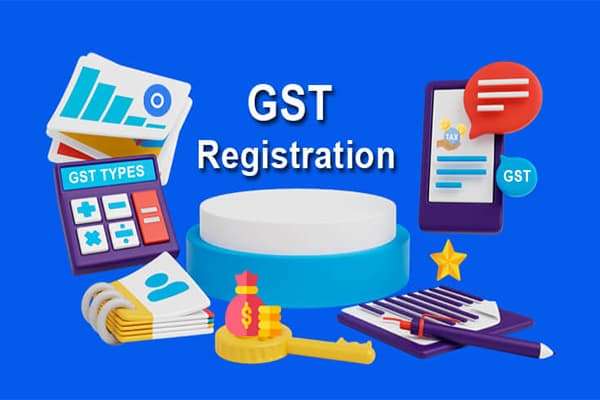GST Registration
GST Registration
Introduced on 1st July 2017, the Goods and Services Tax (GST) has become a unified indirect tax system applicable to service providers, traders, manufacturers, and even freelancers in India. GST was implemented to replace multiple central and state taxes—such as Service Tax, Excise Duty, CST, VAT, Entertainment Tax, and Luxury Tax—with a single, streamlined tax structure. The cost and process of GST registration vary based on the nature of the business and annual turnover. For businesses with an annual turnover of less than ₹1.5 crore, the Composition Scheme offers a simplified compliance option.

GST Registration: Requirements, Process, & Expert Assistance
GST registration is a crucial compliance requirement for businesses and professionals operating in India. It involves obtaining a unique 15-digit Goods and Services Tax Identification Number (GSTIN), which authorizes your business to collect and pay GST while ensuring transparency in transactions. Whether you’re mandated to register, planning to apply for a new GSTIN, or opting for voluntary registration, Stride Tax offers expert assistance to help you complete the registration process smoothly and remain fully compliant with GST regulations.
Key Components of GST Registration
India’s Goods and Services Tax (GST) system is built around three key components, each designed to manage taxation at different jurisdictional levels:
- Central Goods and Services Tax (CGST) :
Levied by the Central Government, CGST is applicable on the intra-state supply of goods and services—meaning the entire transaction takes place within a single state. - State Goods and Services Tax (SGST) : Collected by the State Government, SGST is also charged on intra-state transactions. It is applied alongside CGST, with both taxes sharing the revenue from the transaction.
- Integrated Goods and Services Tax (IGST) : Imposed by the Central Government, IGST applies to inter-state transactions—where goods or services move from one state to another or from a state to a Union Territory. The collected tax is then shared between the Centre and the destination state or Union Territory.
Who is required to register for GST?
GST registration is mandatory for various categories of businesses and individuals based on their turnover, type of supply, or mode of operation. Below is a breakdown of entities and scenarios that require GST registration:
✅ 1. Business Entities
Enterprises with an aggregate annual turnover exceeding ₹40 lakhs must register under GST.
For special category states, the threshold is ₹20 lakhs.
Once the threshold is crossed, applying for a GST certificate is compulsory.
✅ 2. Service Providers
Service-based businesses must register if their annual turnover exceeds ₹20 lakhs.
The threshold is reduced to ₹10 lakhs for special category states.
❌ 3. Exempt Entities
Businesses engaged exclusively in exempt goods or services are not required to register under GST, regardless of turnover.
🔁 4. Previously Registered Businesses
Entities already registered under previous tax systems (such as VAT, Service Tax, or Excise Duty) must migrate to the GST system.
🚚 5. Inter-State Suppliers
Any business or individual supplying goods or services across state lines is required to register, irrespective of turnover.
🧾 6. Casual Taxable Persons
Those making occasional taxable supplies without a fixed place of business in the supply state.
🔄 7. Reverse Charge Mechanism (RCM)
Businesses that are liable to pay tax under the reverse charge mechanism must also register under GST.
📤 8. Input Service Distributors & Agents
Entities distributing input services and their authorised agents need to be GST-compliant.
🛒 9. E-Commerce Operators
Operators or aggregators of e-commerce platforms must register, regardless of turnover.
🌐 10. Non-Resident Taxable Persons
Non-resident individuals or businesses making taxable supplies in India are required to register under GST.
👥 11. Supplier’s Agents
Agents who supply goods or services on behalf of another supplier must obtain GST registration.
🧑💻 12. E-Commerce Sellers
Sellers offering products or services via e-commerce platforms are required to register, regardless of turnover.
💻 13. Overseas Online Service Providers
Foreign service providers offering online information, database access, or retrieval services to unregistered Indian customers must also register under GST.
GST Registration Turnover Limit
While GST registration is mandatory for businesses that exceed specific turnover thresholds, it can also be voluntarily obtained by any individual or entity, regardless of turnover. For those who are required to register, the online GST application process offers a fast and efficient way to stay compliant.
✅ 1. Service Providers
Any person or business providing services with an annual aggregate turnover exceeding ₹20 lakhs must register for GST.
In special category states, the threshold is ₹10 lakhs.
✅ 2. Suppliers of Goods
As per Notification No. 10/2019, any entity exclusively supplying goods is required to register for GST if their annual turnover exceeds ₹40 lakhs, provided the following conditions are met:
They are not providing any services.
They are not making intra-state supplies in the following states:
Arunachal Pradesh, Manipur, Meghalaya, Mizoram, Nagaland, Puducherry, Sikkim, Telangana, Tripura, Uttarakhand.
They are not dealing in restricted goods like ice cream, pan masala, or tobacco.
If any of these conditions are not satisfied, then GST registration becomes mandatory once the turnover exceeds ₹20 lakhs (₹10 lakhs for special category states).
🗺️ 3. Special Category States Under GST
The following are designated as special category states under GST:
Arunachal Pradesh, Assam, Jammu & Kashmir, Manipur, Meghalaya, Mizoram, Nagaland, Sikkim, Tripura, Himachal Pradesh, and Uttarakhand.
📊 4. Understanding Aggregate Turnover
Aggregate turnover includes:
- Taxable supplies
- Exempt supplies
- Exports
- Inter-state supplies
It excludes:
- Taxes levied under GST
- Value of inward supplies on which tax is payable under reverse charge
- Non-taxable supplies
